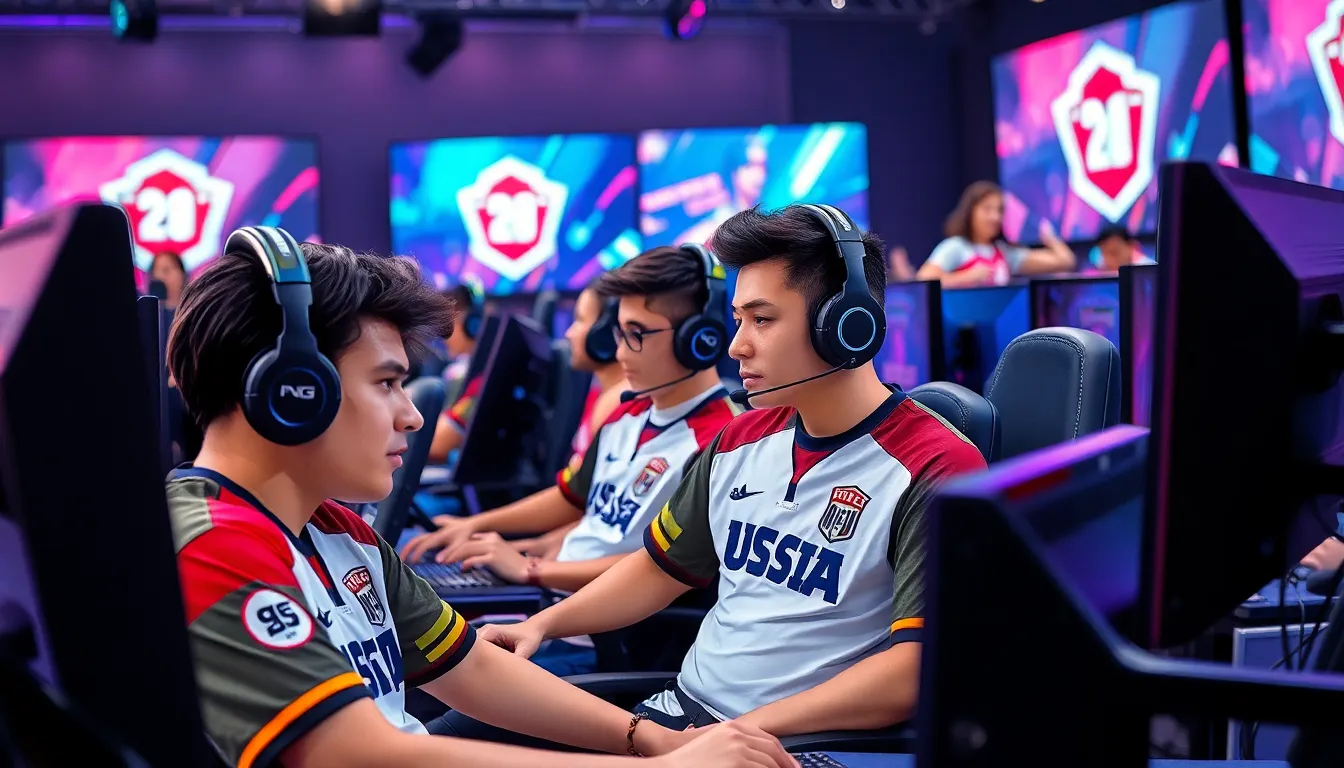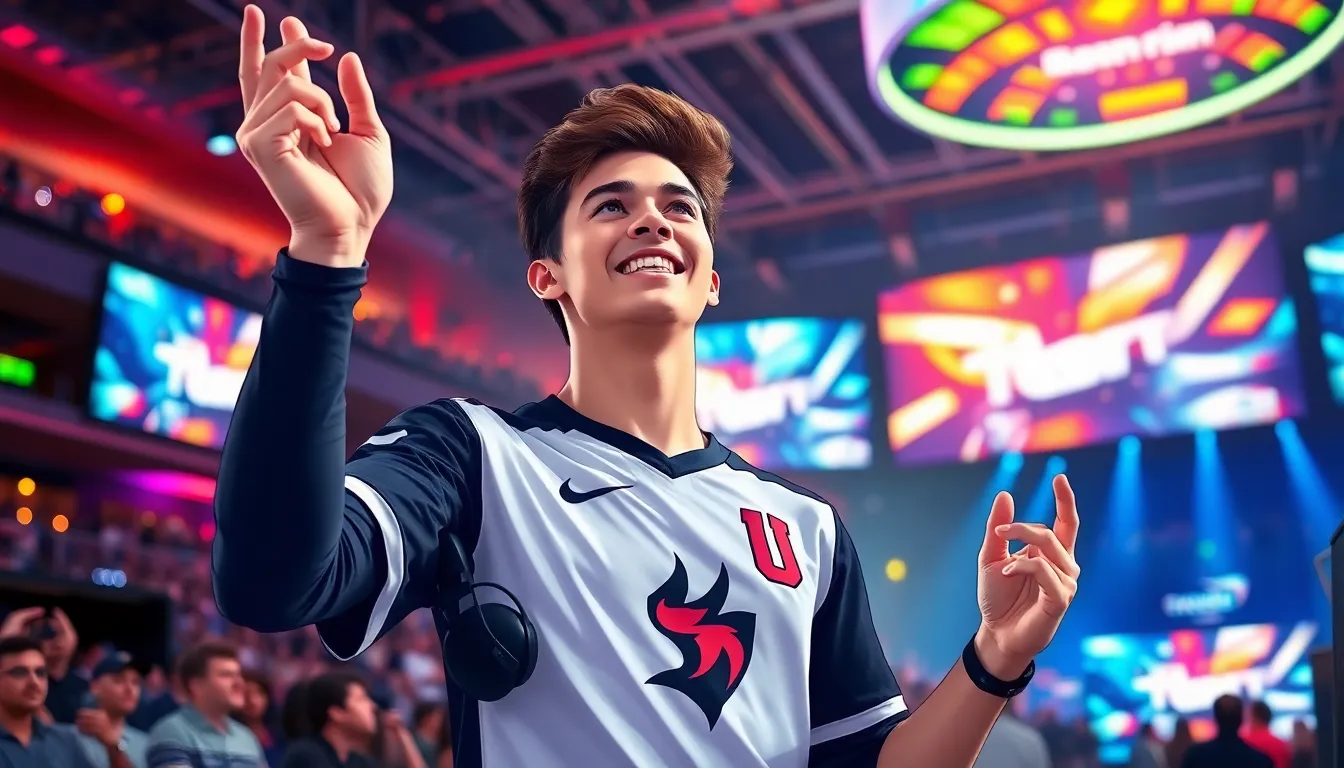In the fast-paced world of esports, where gamers are the rock stars and tournaments fill stadiums, sponsors are the unsung heroes fueling this digital revolution. Companies are jumping on the esports bandwagon faster than a pro gamer hits the “start” button. With millions of fans glued to their screens, brands are discovering that investing in esports isn’t just a trend; it’s a ticket to the future.
Table of Contents
ToggleOverview of Esports Sponsorship
Esports sponsorship plays a crucial role in the rapid growth of the industry. Many companies see significant investment potential, considering engagement numbers in the millions.
Importance of Sponsorship in Esports
Sponsorship in esports provides financial support, enabling teams, events, and organizations to thrive. Benefiting from brand exposure, companies reach diverse audiences through live streams, tournaments, and social media. Competitive gaming also enhances brand loyalty, as supporters often align with their favorite teams and sponsors. Sponsors leverage this connection for targeted marketing strategies, driving sales and enhancing brand recognition. Ultimately, sponsorship efforts contribute to the overall ecosystem of esports, fostering innovation and improving user experiences.
Growth of Esports Sponsors
The number of esports sponsors has surged over recent years. In 2021, worldwide sponsorship revenue reached approximately $1.3 billion, with projections indicating growth to over $2 billion by 2024. Major brands, including Coca-Cola and Intel, actively engage with the esports community, recognizing its potential. Engagement with younger demographics, especially individuals aged 18 to 34, draws companies seeking to capitalize on this expanding market. As the audience and media coverage increase, the landscape for sponsorship continues to evolve, presenting new opportunities for brands to connect with an engaged fan base.
Types of Esports Sponsors

Esports attracts various sponsors, each contributing to the ecosystem in unique ways. The most common types include corporate sponsors, media sponsors, and equipment and product sponsors.
Corporate Sponsors
Corporate sponsors play a pivotal role in funding esports teams and events. They often belong to industries like technology, beverages, and consumer goods. Brands like Coca-Cola and Intel lead corporate sponsorship efforts. These companies leverage esports to engage younger demographics, driving brand awareness through targeted marketing strategies. Sponsorships create opportunities for connecting with millions of fans during tournaments and live streams. Moreover, corporate sponsors benefit from increased brand loyalty by aligning themselves with popular teams and players.
Media Sponsors
Media sponsors enhance visibility by broadcasting esports events across platforms. This sponsorship type includes television networks and streaming services that prioritize gaming content. Partnerships with platforms like Twitch and YouTube Gaming expand the reach of esports to global audiences. In turn, sponsors gain exposure to diverse viewer demographics. Media sponsors also influence content development, placing advertisements in high-traffic streams or tournaments. These actions increase viewer engagement while promoting brand recognition in the fast-growing esports landscape.
Equipment and Product Sponsors
Equipment and product sponsors supply essential gear to players and teams, ensuring top performance during competitions. These sponsors typically represent hardware brands, peripherals, or gaming products. Companies like Razer and Logitech provide sponsorships that include custom equipment and financial support. Sponsorships feature branding on player gear, merchandise, and event signage, reinforcing product visibility. As communities gather around competitive gameplay, these sponsors develop strong connections with fans, fostering brand loyalty. The synergy between gamers and equipment sponsors creates a mutually beneficial relationship that drives continued growth in the industry.
Major Esports Sponsors
Esports sponsorship has become a cornerstone of the industry, significantly impacting team funding and event production.
Notable Brands in the Industry
Coca-Cola stands out as a key player in the esports arena, using its influence to engage with the younger demographic. Intel actively supports various esports events and promotes its technology through partnerships, enhancing brand resonance. Red Bull aligns itself with adrenaline-fueled gaming, associating its brand with high-energy events and popular teams. PepsiCo also invests in sponsorships, showcasing its brands in esports tournaments. Other notable mentions include HyperX and Alienware, both of which provide cutting-edge equipment that players rely on for competitive performance.
Case Studies of Successful Sponsorships
Coca-Cola’s collaboration with ESL exemplifies a successful partnership, leveraging both brands to boost viewer engagement and brand activation during tournaments. Intel’s sponsorship of the Intel Extreme Masters showcases how major brands can enhance event prestige and attract global audiences. Red Bull’s involvement with various esports teams demonstrates its ability to foster community and brand loyalty, yielding positive returns. Twitch’s association with various sponsors provides a platform for brands to reach millions of esports fans effectively. These collaborations highlight the potential for substantial results when brands engage thoughtfully in the esports space.
Benefits of Sponsorship for Brands
Sponsorship in esports offers brands numerous advantages, enhancing their presence and connection with targeted audiences.
Increased Brand Visibility
Sponsorship cultivates significant brand visibility within the esports space. Through association with popular tournaments and teams, sponsors gain exposure to millions of enthusiastic fans. Major events broadcast on platforms like Twitch and YouTube provide invaluable advertising opportunities. Visibility spikes during live streams, allowing brands to reach diverse demographics effectively. Data shows that esports revenue was approximately $1.3 billion in 2021 and projected to exceed $2 billion by 2024, underscoring the expanding audience for sponsors. Companies like Coca-Cola and Intel strategically leverage this visibility to cement their roles in the growing market.
Audience Engagement
Engaging the esports audience becomes easier through targeted sponsorship strategies. Promotions aligned with esports events capture the attention of younger viewers, especially those aged 18 to 34. Brands create interactive experiences by sponsoring tournaments, which enhances fan involvement and loyalty. Successful case studies demonstrate that brands like Red Bull achieve impressive results through integrated marketing efforts in esports. Unique content and experiences resonate with gamers, further solidifying brand connections. Over time, such engagement fosters strong relationships that drive sales and improve brand loyalty.
Challenges Faced by Esports Sponsors
Esports sponsors encounter several challenges in navigating this dynamic landscape.
Market Saturation
Market saturation presents a significant hurdle for esports sponsors. Numerous brands compete for visibility in a crowded field, leading to diminished returns from sponsorship investments. Evolving audience preferences contribute to this challenge, as fans frequently shift their allegiances among teams and platforms. Sponsors increasingly prioritize unique collaborations that stand out from the competition to capture attention. Companies must also analyze engagement metrics and adapt strategies accordingly to remain relevant. Brands that fail to differentiate may struggle to achieve optimal visibility and connection with their target audience.
Authenticity and Brand Alignment
Authenticity and brand alignment pose critical challenges for esports sponsors. Brands often need to project genuine connections with the gaming community, as fans value transparency and sincerity. Misalignment between a sponsor’s image and the esports culture can lead to negative perceptions and backlash. Successful sponsorships hinge on the ability to reflect shared values and engage in meaningful ways. Brands that resonate with esports audiences increase the likelihood of fostering brand loyalty. Establishing trust within the community encourages long-term partnerships and enhances the overall impact of sponsorship initiatives.
Future Trends in Esports Sponsorship
Esports sponsorship continues to evolve, shaping the future of brand engagement. New players in the entertainment industry are entering the sponsorship arena, recognizing the power of esports to reach target demographics.
Rise of New Sponsors
Emerging brands are increasingly investing in esports partnerships. Companies outside traditional markets, like lifestyle and wellness brands, see value in this vibrant community. Sponsorship from these non-endemic brands aims to connect with the younger demographic, enhancing their market presence. For example, brands focusing on health and fitness have collaborated with esports teams to promote products directly to gamers. Such strategic alignments expand the reach of these companies beyond conventional advertising platforms. The involvement of new sponsors indicates a significant shift, as excitement around esports attracts diverse industries.
Evolution of Sponsorship Strategies
Sponsorship strategies are adapting to meet evolving audience expectations. Brands increasingly leverage interactive elements to engage fans during events. Incorporating augmented reality experiences enhances viewer interaction, creating memorable moments. Additionally, personalized marketing efforts are gaining traction, allowing brands to connect on a deeper level with esports enthusiasts. Aligning sponsorship efforts with trending games and competitions also proves beneficial, as it taps into existing fan excitement. Data analytics plays a crucial role in this evolution, providing insights that shape effective outreach strategies. Brands that adapt to the dynamic landscape of esports sponsorship can achieve stronger connections and increased loyalty from fans.
The esports sponsorship landscape is thriving and evolving rapidly. Brands recognize the immense potential of engaging with a passionate audience that continues to grow. As companies navigate this dynamic environment, the emphasis on authentic connections and innovative strategies will be crucial for success.
With projections indicating substantial revenue growth, the opportunities for brands to make an impact are significant. By aligning with the culture and values of the esports community, sponsors can foster lasting relationships that not only enhance brand loyalty but also drive meaningful engagement. The future of esports sponsorship promises to be exciting as new players and creative strategies emerge.

